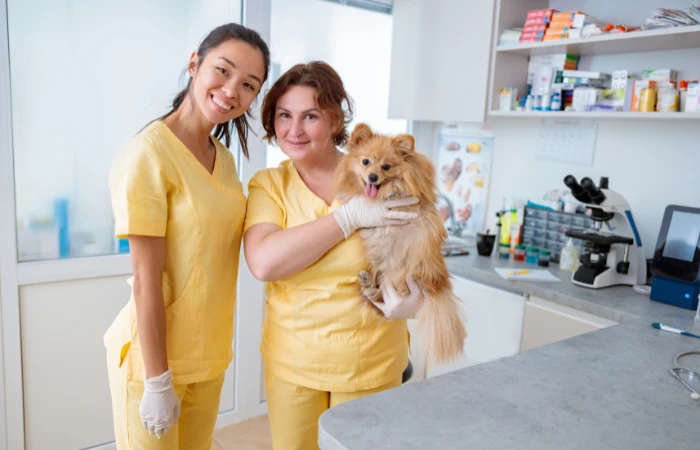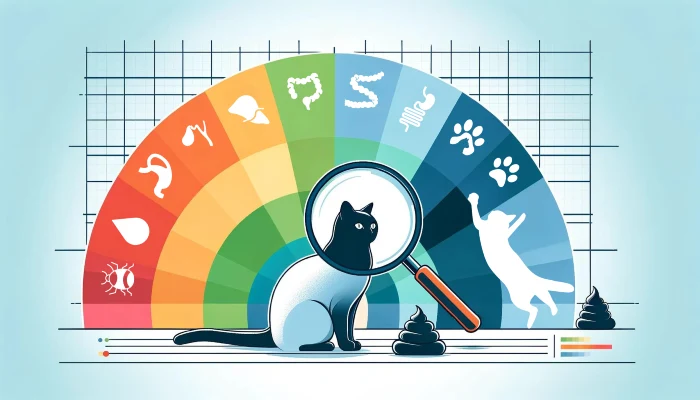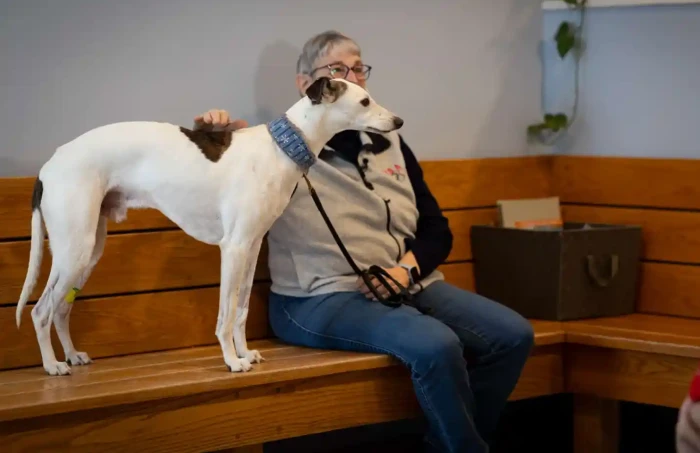I have experience as both an employee and a client of a veterinary practice, this gave me the opportunity to see first hand the good, bad and ugly side of each. I want to let you know that there are pros and cons on both sides of the exam table and help you see what each side experiences.
I was an employee before I was a client, so let’s start from that side.
The Employee Side
I worked positions in both the front and back of the vet’s office, I did a little of everything, I answered phones, scheduled appointments, checked clients in and out, as well as cleaned kennels, held pets for treatment and cleaned surgery rooms and equipment, so needless to say I saw a lot.
Working in the front of the office can be fun, exciting, sad as well as frustrating.
I got to know the clients as well as the pets, some from their first day until their last. It was always fun to see the excitement of a client with their new pet and be able to see their bond grow over the years. We had some clients that were very dedicated to their pet, and considered them a member of the family and would do anything possible to keep their pet healthy, but we also had clients that saw their pets as more of an object, something that was kept out in the yard and only taken to the vet for vaccines.
I would take calls from clients that would tell me their pet was vomiting all weekend and what can they do at home to stop it, and when I would tell them we should see the pet to find out the reason, they would say they didn’t want to spend the money on it and only wanted to get a quick fix for the problem.
Believe me, I completely understand a client that doesn’t have the money for a lot of tests and other procedures. I’ve certainly been in that situation myself, but they would still make an appointment for an exam to at least find out if it is something really serious or just an upset stomach and then make a decision on what treatment options they could afford.
It’s heartbreaking for a person that works in the veterinary field (from the vet to the vet assistant) to know there is an animal that needs help, and you can’t do anything to help it.
I have had clients call and demand to have their pet seen the same day because they were sick all weekend. They were scared. But, and it happened many times, when I told them we could fit them in at 9am as an emergency slot, only to be told they can’t make that time because they have a hair appointment.
Priorities, I suppose.
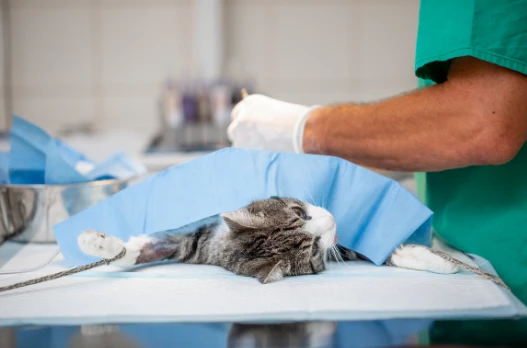
Please understand that the appointment schedule is booked days and even weeks in advance and when you need to be seen that day, take the appointment time given to you, it is best for your pet as well as the other animals that are being seen that day.
I was the one in the chair behind the desk. I handled the phones, billing, appointment setting, customer service, etc. Needless to say, I got yelled at a lot by irate, impatient and downright nasty people.
Here are just a few of the reasons I was most frequently on the receiving end of an adult’s tantrum:
- I couldn’t get them an appointment at the exact day and time they wanted one.
- They have been waiting for 30 minutes to see the vet after I explained that the vet had an emergency.
- They weren’t happy with their bill, even though they were told in advance what the procedure would cost.
I took it all with a grain of salt and had to bite my tongue a lot, but I could understand to some point why they were upset.
Working in the back of the office, I was able to be more hands on with the pets and saw and experienced the wide range of emotions that came with that.
It was fun, exciting, sad, frustrating and stressful, but I wouldn’t trade the time I spent working in this position.
It was interesting to be able to see the all the pieces that come into play taking care of animals, watching and helping a vet do everything from, a pet’s first vaccine, a surgical procedure to difficult treatments.
Seeing how they don’t have the benefit of their patient being able to tell them exactly what is wrong with them, but having to take the symptoms as their guide on what tests or procedures need to be done to make this animal better.
I think a lot of clients who have issues with how many tests or procedures a vet wants to do need to know that sometimes (yes, there are vets that will ask to do unnecessary tests, etc.) doing all of these things is the only way to know exactly what the problem is.
It’s important to know, just as it happens with human doctors, that there are vets that are more driven by financial gain and will add unnecessary procedures. But, the majority of vets are in it for the right reasons and are trying to do the best they can to give your pet the best care possible.
Yes, vet prices are high, just like they are with human doctors, but if you develop a good relationship with your pet’s vet, they will try to work with you to cut costs.
Since I have been on both sides of the billing, I know how much the markup on medication, vaccines, procedures, foods and supplies are, the amount of the markups vary from clinic to clinic. I have had the benefit as an employee of receiving things at cost and also knowing that some medications can be purchased over the counter.

Of course, getting a bill, as any client does, can be overwhelming and this is where developing a good relationship with your pets’ vet comes into play. If you’re a regular client and the vet knows your pet well, oftentimes they will let you know if you can get a medication over the counter. And if they don’t, ask!
Meds like Benadryl (diphenhydramine), Imodium (Loperimide), Aspirin, etc. along with the correct dosage (the dosage for animals is very different from the human dosage) have veterinary counterparts. Oftentimes, the human version is cheaper!
Keep in mind, when you see your bill, that it’s expensive to run a veterinary clinic.
There are costs for the building, equipment, staff, inventory, supplies and utilities, so be understanding before complaining too much. If you are a first time owner and have never needed a vet before, be sure to research the vets (there are some bad vets and clinics out there) in your area and look at reviews online to see what vets other pet owners are using and are happy with.
Do your homework, just like you would when finding a doctor for yourself! Visit the clinic and talk to the vet and staff to see if you’re comfortable with them. The clinic should be clean, and the staff should be happy to answer any questions you might have concerning costs.
And a prospective client just stopping in to scope out the situation shouldn’t bother or annoy any staff member. A list of important questions you should ask when searching for a vet for your pet is provided below.
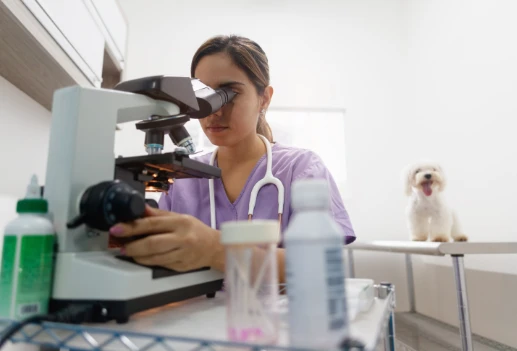
The Client Side
Now let’s discuss the client’s side. I had pets even after I wasn’t working at the vet clinic anymore, and I got to see how things are from the client’s point of view.
Having dealt with the good, bad and ugly at the front desk, I had a little more patience when it came to scheduling and costs, but I also understand the frustration that clients can feel with these issues.
I owned a breed of dog that is prone to certain health issues and experienced the frustration and helplessness a client feels when having to figure out how to come up with the money to treat a serious health issue with a beloved pet. It’s downright scary as hell! And I wanted to do everything I could to make my pet healthy again, I couldn’t imagine losing him.
The vet said he would need a very delicate surgery and a lot of aftercare, medication and special food to get through this. I had to make the choice to come up with the finances to pay for all of this, or to put him down. Well, I definitely wasn’t going to give up on him, so if it meant I would do without and max out my credit cards, so be it. And that’s what I did.
I don’t regret my decision in any way, but I can understand how this dilemma affects other people in this situation. Believe me, I understand when an owner has to make the difficult decision to put a pet down due to cost of treatment.
Sitting in the waiting room, I heard and saw good owners and horrible owners, people that wouldn’t control their pets, had unruly kids with them, were rude to the staff and other clients in the waiting room, believe me, I saw it all.
I know the frustration of waiting for one hour past your appointment time, but you don’t have to make a big scene in the office.
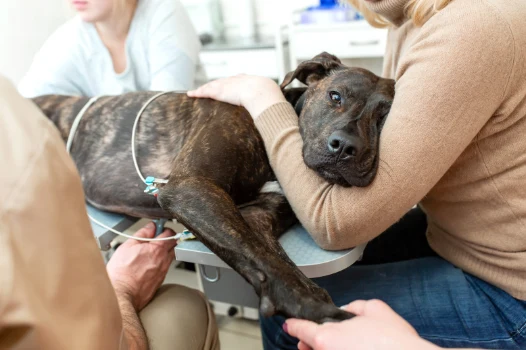
More To Discover
- Struggling Beekeepers Fight to Protect Vital Honeybee Colonies Amidst Growing Challenges
- 10 Common Mistakes People Make with Crate Training a Puppy
- Exploring the Potential of Insect-Based Feeds for Sustainable Meat and Dairy Production
- Pyrolysis: Plastic Recycling Solution or Just High-Tech Incineration?
The reality is that emergencies happen.
If you were in the pet owner’s place whose pet was receiving life-saving emergency care, I doubt you would want to hear someone complaining about having to wait for their dog’s vaccine appointment.
If you have to be somewhere else, reschedule for another day.
As a client, I have dealt with rude front desk staff and I understand how frustrating it can be to be talked to like you are an idiot or even worse, to be ignored.
When it happened to me, I knew this staff had no idea that I had worked at a vet clinic before and know how scheduling and billing works, but there is absolutely no reason to treat a client rudely.
Don’t hesitate to tell the vet when a staff member has treated you unprofessionally. The vet needs, and wants, to know. They want to get it handled ASAP and they’ll appreciate knowing. After all, their clinic’s reputation, and their livelihood, is at stake.
It’s important as a client not to be rude to the staff, the only thing this will accomplish is that they will be less willing to work with you on things.
The front staff really does have to follow the appointment schedule (the vet can only see so many patients a day and must keep some spaces open for emergencies) and can’t create space just because you have the day off, or you were in the neighborhood. Be understanding and be nice, if you aren’t the next time you call to make an appointment, you might not be able to get one that’s convenient to your schedule.
Just treat the vet and staff how you want them to treat you. You’re all on the same team! Of course, if you feel that you are being disrespected, talk to someone about it and if the problem continues, find a new vet.
Having clients is what keeps them all working, so you should be treated respectfully, but you also have to be respectful of them, they are there for you and your pet.
As long as both sides of the exam table stay friendly and respectful of each other, your pet will receive the care he needs to live a happy and healthy life.
10 Over The Counter Medications That Can Be Used for Pets
Note: Be sure to ask your vet for the correct dosage for your pet.
- Artificial Tears
- Aspirin
- Benadryl (Diphenhydramine)
- Clariton (Loratadine)
- Imodium (Loperimide)
- Neosporin (Anti-bacterial ointment without steroids)
- Pepto-Bismol (Bismuth subsalicylate)
- Pepcid AC (Famotidine)
- Tagamet (Cimetidine)
- Zyrtec (Cetirizine)
12 Important Questions to Ask When Searching for a Vet for Your Pet
- What are your business hours?
- What species of animals does your practice see?
- What is the cost of an office visit?
- Do you accept walk ins or is it by appointment only?
- How many vets do you have on staff?
- What medical services does your clinic/hospital offer?
- What are the costs for vaccines for a dog/cat?
- What are the costs of heartworm or flea prevention?
- Can I tour your facility before making an appointment for my pet?
- Do you have emergency services available?
- Where do you refer your patients in an emergency?
- What are your payment policies?








